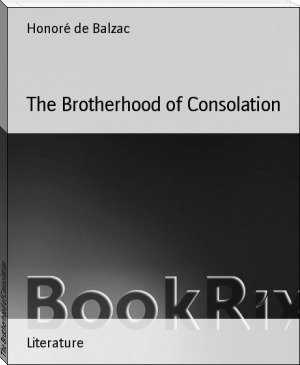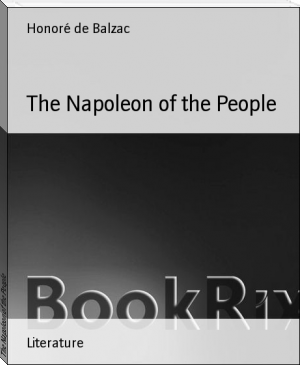The Brotherhood of Consolation by Honoré de Balzac (ereader manga txt) 📖

- Author: Honoré de Balzac
Book online «The Brotherhood of Consolation by Honoré de Balzac (ereader manga txt) 📖». Author Honoré de Balzac
a man who, ever since 1794 has played a double part, who for eight
years deceived the Comte de Lille and his adherents, and probably
deceived at the same time the police of the Republic and the
Empire: such men belong only to those who pay them most.
Bryond pushed Rifoel to crime; he instigated the attacks of armed
men upon the mail-coaches bearing the moneys of the government,
and the levying of a heavy tribute from the purchasers of the
National domain; a tax he enforced by means of tortures invented
by him which carried terror through five departments. He then
demanded that a sum of three hundred thousand francs derived from
these plunderings be paid to him for the liquidation of his debts.
When he met with resistance on the part of his wife and Rifoel,
and saw the contempt his proposal inspired in upright minds who
were acting only from party spirit, he determined to bring them
both under the rigor of the law in the next occasion of their
committing a crime.
He disappeared, and returned to Paris, taking with him all
information as to the then condition of the departments of the
West.
The brothers Chaussard and Vauthier were, as the chancellor knows,
Bryond's correspondents.
As soon as the attack was made on the diligence from Caen, Bryond
returned secretly and in disguise, under the name of Le Marchand.
He put himself into secret communication with the prefect and the
magistrates. What was the result? Never was any conspiracy, in
which a great number of persons took part, so rapidly discovered
and dealt with. Within six days after the committal of the crime
all the guilty persons were followed and watched with an
intelligence which showed the most accurate knowledge of the
plans, and of the individuals concerned in them. The immediate
arrest, trial, and execution of Rifoel and his accomplices are the
proof of this. We repeat, the chancellor knows even more than we
do on this subject.
If ever a condemned person had a right to appeal to the
Sovereign's mercy it is Henriette Lechantre.
Though led astray by love, by ideas of rebellion which she sucked
in with the milk that fed her, she is, most certainly, inexcusable
in the eyes of the law; but in the eyes of the most magnanimous of
emperors, will not her misfortunes, the infamous betrayal of her
husband, and a rash enthusiasm plead for her?
The greatest of all captains, the immortal genius which pardoned
the Prince of Hatzfeldt and is able to divine the reasons of the
heart, will he not admit the fatal power of love, invincible in
youth, which extenuates this crime, great as it was?
Twenty-two heads have fallen under the blade of the law; only one
of the guilty persons is now left, and she is a young woman, a
minor, not twenty years of age. Will not the Emperor Napoleon the
Great grant her life, and give her time in which to repent? Is not
that to share the part of God?
For Henriette Lechantre, wife of Bryond des Tour-Minieres,--
Her defender, Bordin, Barrister of the Lower Court of the Department of the Seine.
This dreadful drama disturbed the little sleep that Godefroid took. He dreamed of that penalty of death such as the physician Guillotin has made it with a philanthropic object. Through the hot vapors of a nightmare he saw a young woman, beautiful, enthusiastic, enduring the last preparations, drawn in that fatal tumbril, mounting the scaffold, and crying out, "Vive le roi!"
Eager to know the whole, Godefroid rose at dawn, dressed, and paced his room; then stood mechanically at his window gazing at the sky, while his thoughts reconstructed this drama in many volumes. Ever, on that darksome background of Chouans, peasants, country gentlemen, rebel leaders, spies, and officers of justice, he saw the vivid figures of the mother and the daughter detach themselves; the daughter misleading the mother; the daughter victim of a monster; victim, too, of her passion for one of those bold men whom, later, we have glorified as heroes, and to whom even Godefroid's imagination lent a likeness to the Charettes and the Georges Cadoudals,--those giants of the struggle between the Republic and the Monarchy.
As soon as Godefroid heard the goodman Alain stirring in the room above him, he went there; but he had no sooner opened the door than he closed it and went back to his own apartment. The old man, kneeling by his chair, was saying his morning prayer. The sight of that whitened head, bowed in an attitude of humble reverence, reminded Godefroid of his own forgotten duties, and he prayed fervently.
"I expected you," said the kind old man, when Godefroid entered his room some fifteen minutes later. "I got up earlier than usual, for I felt sure you would be impatient."
"Madame Henriette?" asked Godefroid, with visible anxiety.
"Was Madame's daughter!" replied Monsieur Alain. "Madame's name is Lechantre de la Chanterie. Under the Empire none of the nobiliary titles were allowed, nor any of the names added to the patronymic or original names. Therefore, the Baronne des Tours-Minieres was called Madame Bryond. The Marquis d'Esgrignon took his name of Carol (citizen Carol); later he was called the Sieur Carol. The Troisvilles became the Sieurs Guibelin."
"But what happened? Did the Emperor pardon her?"
"Alas, no!" replied Alain. "The unfortunate little woman, not twenty-one years old, perished on the scaffold. After reading Bordin's appeal, the Emperor answered very much in these terms: 'Why be so bitter against the spy? A spy is no longer a man; he ought not to have feelings; he is a wheel of the machinery; Bryond did his duty. If instruments of that kind were not what they are,--steel bars,--and intelligent only in the service of the power employing them, government would not be possible. The sentences of criminal courts must be carried out, or the judges would cease to have confidence in themselves or in me. Besides, the women of the West must be taught not to meddle in plots. It is precisely in the case of a woman that justice should not be interfered with. There is no excuse possible for an attack on power?' This was the substance of what the Emperor said, as Bordin repeated it to me. Learning a little later that France and Russia were about to measure swords against each other, and that the Emperor was to go two thousand miles from Paris to attack a vast and desert country, Bordin understood the secret reason of the Emperor's harshness. To insure tranquillity at the West, now full of refractories, Napoleon believed it necessary to inspire terror. Bordin could do no more."
"But Madame de la Chanterie?" said Godefroid.
"Madame de la Chanterie was sentenced to twenty years' imprisonment," replied Alain. "As she was already transferred to Bicetre, near Rouen, to undergo her punishment, nothing was attempted on her behalf until every effort had been made to save Henriette, who had grown dearer than ever to her mother during this time of anxiety. Indeed, if it had not been for Bordin's assurance that he could obtain Henriette's pardon, it is doubtful if Madame could have survived the shock of the sentence. When the appeal failed, they deceived the poor mother. She saw her daughter once after the execution of the other prisoners, not knowing that Madame Bryond's respite was due to a false declaration of pregnancy, made to gain time for the appeal."
"Ah! I understand it all now," exclaimed Godefroid.
"No, my dear child, there are things that no one can imagine. Madame thought her daughter living for a long time."
"How was that?"
"When Madame des Tours-Minieres learned from Bordin that her appeal was rejected and that nothing could save her, that sublime little woman had the courage to write twenty letters, dating them month by month after the time of her execution, so as to make her poor mother in her prison believe she was alive. In those letters she told of a gradual illness which would end in death. They covered a period of two years. Madame de la Chanterie was therefore prepared for the news of her daughter's death, but she thought it a natural one. She did not know until 1814 that Henriette had died on the scaffold. For two years Madame was herded among the most depraved of her sex, but thanks to the urgency of the Champignelles and the Beauseants she was, after the second year, placed in a cell by herself, where she lived like a cloistered nun."
"And the others?" asked Godefroid.
"The notary Leveille, Herbomez, Hiley, Cibot, Grenier, Horeau, Cabot, Minard, and Mallet were condemned to death, and executed the same day. Pannier, condemned to hard labor for twenty years, was branded and sent to the galleys. The Chaussards and Vauthier received the same sentence, but were pardoned by the Emperor. Melin, Laraviniere and Binet, were condemned to five years' imprisonment. The woman Bourget to twenty years' imprisonment. Chargegrain and Rousseau were acquitted. Those who escaped were all condemned to death, except the girl Godard, who was no other, as you have probably guessed, than our poor Manon--"
"Manon!" exclaimed Godefroid.
"Oh! you don't know Manon yet," replied the kind old Alain. "That devoted creature, condemned to twelve years' imprisonment, gave herself up that she might take care of Madame de la Chanterie, and wait upon her. Our dear vicar was the priest at Mortagne who gave the last sacraments to the Baronne des Tours-Minieres; he had the courage to go with her to the scaffold, and to him she gave her farewell kiss. That courageous, noble priest had also accompanied the Chevalier du Vissard. Our dear Abbe de Veze has therefore known all the secrets of those days."
"I see why his hair is so white," said Godefroid.
"Alas! yes," said Alain. "He received from Amedee du Vissard a miniature of Madame des Tours-Minieres, the only portrait of her that exists; therefore, the abbe became almost sacred in Madame de la Chanterie's eyes when she re-entered social existence."
"When did that happen?" asked Godefroid.
"Why, at the restoration of Louis XVIII., in 1814. The Marquis du Vissard, eldest brother of the Chevalier, was created peer of France and loaded with honors by the king. The brother of Monsieur d'Herbomez was made a count and receiver-general. The poor banker Pannier died of grief at the galleys. Boislaurier died without children, a lieutenant-general and governor of a royal chateau. Messieurs de Champignelles, de Beauseant, the Duc de Verneuil, and the Keeper of the Seals presented Madame de la Chanterie to the king. 'You have suffered greatly for me, madame la baronne; you have every right to my favor and gratitude,' he said to her. 'Sire,' she replied, 'your Majesty has so many sorrows to console that I do not wish that mine, which is inconsolable, should be a burden upon you. To live forgotten, to mourn my daughter, and do some good, that is my life. If anything could soften my grief, it is the kindness of my king, it is the
 Have you ever thought about what fiction is? Probably, such a question may seem surprising: and so everything is clear. Every person throughout his life has to repeatedly create the works he needs for specific purposes - statements, autobiographies, dictations - using not gypsum or clay, not musical notes, not paints, but just a word. At the same time, almost every person will be very surprised if he is told that he thereby created a work of fiction, which is very different from visual art, music and sculpture making. However, everyone understands that a student's essay or dictation is fundamentally different from novels, short stories, news that are created by professional writers. In the works of professionals there is the most important difference - excogitation. But, oddly enough, in a school literature course, you don’t realize the full power of fiction. So using our website in your free time discover fiction for yourself.
Have you ever thought about what fiction is? Probably, such a question may seem surprising: and so everything is clear. Every person throughout his life has to repeatedly create the works he needs for specific purposes - statements, autobiographies, dictations - using not gypsum or clay, not musical notes, not paints, but just a word. At the same time, almost every person will be very surprised if he is told that he thereby created a work of fiction, which is very different from visual art, music and sculpture making. However, everyone understands that a student's essay or dictation is fundamentally different from novels, short stories, news that are created by professional writers. In the works of professionals there is the most important difference - excogitation. But, oddly enough, in a school literature course, you don’t realize the full power of fiction. So using our website in your free time discover fiction for yourself. 




Comments (0)